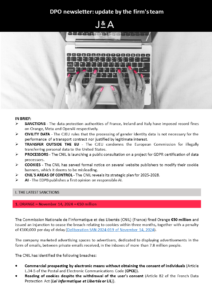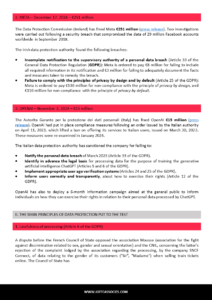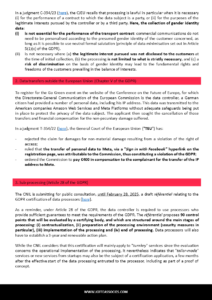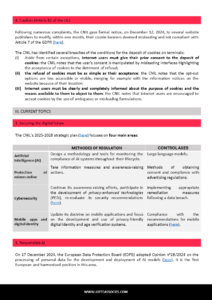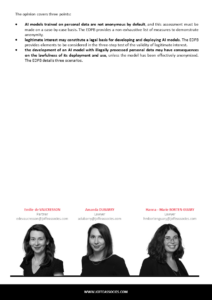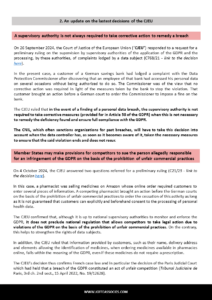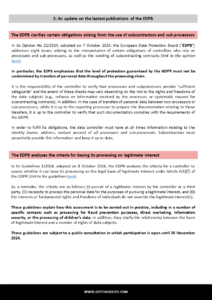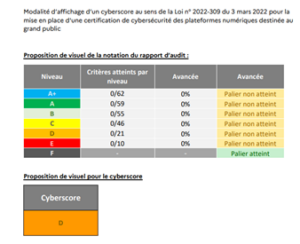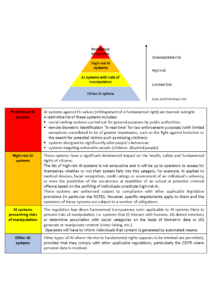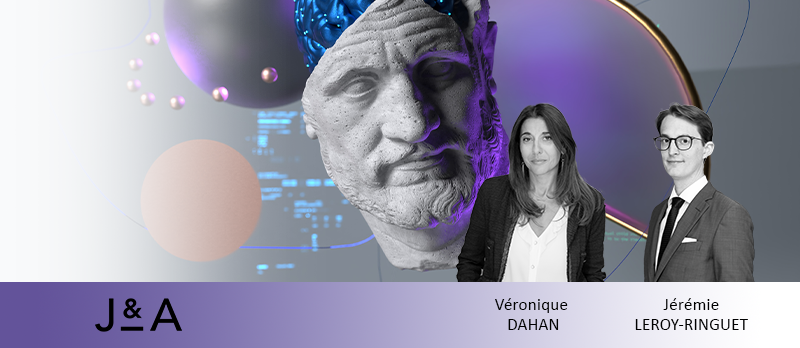Read the original article in “Village de la Justice”, written by Véronique Dahan and Jérémie Leroy-Ringuet here.
Chat-GPT, Dall-E 2, Stable Diffusion… Are the creations of artificial intelligence protectable works? Who could claim to be the author? But above all, do the authors of pre-existing works have rights against the use of their style and their works by AI?
The use of artificial intelligence (AI) by companies, especially for their communication, is becoming more and more widespread. Software such as Stable Diffusion, Midjourney, Craiyon, but especially Dall-E 2, developed by OpenAI and launched in January 2022, make it possible to create images from natural language instructions (text-to-image). It is also possible to create music or text in the same way, for example by asking a software program to write a description of a landscape of fjords at sunset, with tools such as the Chat-GPT robot, launched in November 2022 by OpenAI.
Beyond their playfulness, the possible artistic or professional applications of such software are quite varied: illustration of an article, creation of a brand, a logo, a slogan, a jingle, texts for a website, for an advertising medium or for a post on social networks, etc., and soon perhaps complex literary works or films. Artists have seized upon it to develop an art form called AI Art, Prompt Art or GANism (in reference to Generative Adversarial Networks) and, sometimes, by transforming the results obtained into NFT [1].
AI can thus be of significant help, whether by providing ready-to-use content or simple starting ideas to be developed by “human” means or by using other more “traditional” software. The image, the text or the group of words obtained with an economy of time and effort can thus be reworked and perfected, the results obtained still being sometimes imperfect.
In order to produce a custom image, software needs to be fed with pre-existing images and metadata about these images (this is called “deep-learning”).
For example, in order to create an image of Mona Lisa in the style of Van Gogh, the software needs to be fed with 1° images reproducing Leonardo da Vinci’s Mona Lisa, 2° information that these images represent Mona Lisa, 3° images of Van Gogh’s paintings and 4° information that these images represent Van Gogh’s paintings. The more reliable information the software has, the more convincing the result will be:

(Image créée avec Stable Diffusion.)
It would also be possible, for example, to create images that do not incorporate pre-existing works but refer generally to the style of artists whose works are either in the public domain or still protected (i.e., whose author is alive, or has been dead for less than seventy years), such as an image of a Jeff Koons-style sculpture.
The same principle applies to texts: if one asks a text generator to create a Shakespearean dialogue between two tax lawyers who meet in front of a London Underground station and talk about Brexit, the text will reproduce the English archaisms typical of Elizabethan theater.
Like any technological novelty, the use of such software raises many legal questions.
The purpose of this article is to answer in particular the central question: who owns the rights (if any) on the content generated by AI?
Under French law, a work is protectable if it is original. Originality is defined as revealing the imprint of the personality of the author, who can only be a human being. It is therefore necessary to determine who is the author, or who are the authors of an image or a text created via an instruction given to a software. It is also necessary to determine who can be the owner of the rights since a person who is not the author can be, by the effect of the law, the contract or by presumption, owner of the exploitation rights of the work.
In the process of creating a version of the Mona Lisa by Vinci in the style of Van Gogh, several people may or may not have voluntarily contributed to the creation of the image (being authors or co-authors) or owned the rights:
- The authors of the pre-existing works, i.e. Leonardo da Vinci and Vincent Van Gogh,
- We ourselves, when we gave as instruction to the software: “Mona Lisa in the style of Van Gogh”,
- The author of the software Stable Diffusion and the company operating the site Stable Diffusion.
The rights of the software operators (Stable Diffusion, Dall-E 2, Midjourney…).
The entities exploiting the sites of Stable Diffusion, Dall-E 2, etc. claim in their general conditions their ownership of the rights related to their software. They are thus able to authorize or prohibit the use that the Internet users make of their software.
These softwares contribute to the process of obtaining new texts and images, insofar as it is these image generators that, in our example, have selected a bluish nocturnal atmosphere with the spirals of The starry night rather than, for example, the green and yellow decor of Wheat field with cypresses which would have been equally and perhaps better suited. We can also notice that the software has chosen to raise the right arm of Mona Lisa as in L’Arlésienne (Madame Ginoux) or in Portrait of Dr. Gachet, and to make her sit on a chair that evokes by its color and the shape of its ornaments the chair of Gauguin.
We are not in the situation of a purely passive participation (as would be that of a paintbrush for a painter or a word processing software for a writer): it is precisely the part of “autonomy” of AI software that throws the traditional conception of copyright into confusion. Nevertheless, the software’s contribution is automated and, in our view, the technical use of software to create an image or text does not give the owner of the software any rights over the image or text: in the absence of human intervention in the choice of colors and shapes, no copyright or co-authorship can be claimed on behalf of the software operator.
The terms of use of these text and image generators confirm this. In the case of Dall-E 2, the terms of use expressly state that OpenAI transfers all rights to the texts and images obtained to the user and even requests that the content be attributed to the person who “created” it or to his company.
Stable Diffusion does the same by granting a perpetual, worldwide, non-exclusive, free, royalty-free and irrevocable copyright license for all types of use, including commercial. But in the absence, in our opinion, of any transferable rights, these provisions seem to us to be mere precautions.
Other sites such as Craiyon do not provide for the transfer of rights to the benefit of the user on the results obtained but only frame the use of the software, by providing for specific licenses in the case of commercial uses of the images created. The paying nature of these licenses depends on the turnover of the company using the images created on its site. We understand that it is more a question for Craiyon to monetize the use of a software that represented an investment for the company than to determine the contours of a transfer of copyright.
It is therefore essential for anyone wishing to use, commercially or not, the images created via AI tools, to check whether the company operating the site where he creates them gives him the rights and under what conditions, even if it is not a question of conditions relating to the ownership of rights on the contents.
The rights of the person using the software.
Since the creative contribution of the person who gives instructions to the image or text generator is limited to the production of an idea implemented by the software, and since the ideas are not protectable by copyright, it is doubtful that this person is recognized as the author.
This is especially true since, when an instruction is given to the software, the result of the instruction is unknown until it appears on the screen, and even very precise instructions can give very different results – as would be the case if the instructions were given to human beings. Since the user of the software does not mentally design the resulting image in advance, it is difficult to argue that the image bears the “imprint of his or her personality”.
This is particularly evident in the case of succinct instructions or instructions containing abstract terms.
Thus, the results obtained by us on Dall-E 2 by giving as instruction “the unbearable lightness of being” could present images, certainly evoking lightness, but as visually different – and thus unexpected and disconnected from our “personalities” – as the following:

(Creations by Dall·E 2)
But above all, one could go as far as to deny the qualification of intellectual work to images and texts created by AI. Indeed, if the Intellectual Property Code (IPC) does not define what a work is, it only grants copyright protection to “works of the mind” created by humans. In the absence of a positive creative action by a human between the time the instructions are given and the time the results appear on the screen, it could be argued that no “mind” is mobilized, and therefore no copyrightable “work of the mind” is created. For this reason, the authors of such software and the companies exploiting them could not claim to be authors or co-authors.
If they are not “works of the mind”, the texts and images created by AI would then be intangible goods under common law as can be non-original creations. They are appropriable not by copyright (by the sole fact of their creation, article L. 111-1 of the CPI) but by possession (article 2276 of the civil code) or by contract (general conditions granting the property to the user).
It is then a question of creations free of rights, belonging to the public domain even though they could have been considered as original and protectable if they had been created by human hands.
This echoes other types of authorless “works” such as the paintings of the Congo chimpanzee or the famous selfies taken in 2008 by a macaque. The U.S. courts ruled that a self-portrait taken by a monkey who grabbed a camera and clicked the shutter was not a protectable work because it was not created by a human, who is the subject of rights.
If the question had been presented before a French court, it would have most certainly judged that this selfie is not even a “work of the mind” in the sense of the CPI.
On the other hand, as soon as the result obtained is reworked and a formal personal contribution transforms this result, the qualification of intellectual work can be retained, but only because of the original modification brought to the result produced by the software. This case is also provided for in the Dall-E 2 Sharing & Publication Policy, which asks its users who modify the results obtained not to present them as having been entirely produced by the software or entirely produced by a human being, which is more of an ethical rule, of transparency, than a legal requirement.
The US Copyright Office [2] has recently published guidelines in this sense, with a clearly legal scope: it announces that it will refuse protection for content, or parts of works created exclusively by AI and will eventually grant it only for elements on which a human being has intervened [3].
The rights of authors of pre-existing works.
In French law, a new work that incorporates a pre-existing work without the participation of its author is said to be “composite” [4]. If the pre-existing works are in the public domain, such as those of Vinci and Van Gogh, their free use is permitted (subject to the possible opposition of the moral right by the right holders). On the other hand, to incorporate without authorization a pre-existing work still protected constitutes an act of infringement.
In our example, we consider that the Mona Lisa in the style of Van Gogh cannot however be qualified as a composite work since it cannot be a “work of the mind”. This does not mean, however, that the authors of pre-existing works do not have rights on, or against, the texts or images created by reusing their styles or their works.
Indeed, if we replace our Mona Lisa with an image obtained, for example, by entering the instructions: “Guernica by Picasso in colors”, we will obtain an image that integrates and modifies a pre-existing work. Picasso’s works are not in the public domain. The painter’s heirs therefore have rights over the image that would be created in this way. They must be able to authorize or prohibit not only the exploitation of the image obtained and request its destruction, but perhaps also prohibit or authorize the use of Picasso’s works by the software – which, let us recall, draws on its “knowledge” of a considerable number of images, necessarily including reproductions of Picasso’s works, in order to respond to the instructions it is given.
The production and publication by a user of a “Guernica in color” could therefore constitute an infringement; but the integration of Guernica in the software’s database could also, by itself, constitute an infringing act.
Indeed, the sites proposing image generators by AI fed with protected works could theoretically be considered as infringers by the CPI which punishes the fact of “publishing, making available to the public or communicating to the public, knowingly and in any form whatsoever, software obviously intended for the unauthorized making available to the public of protected works or objects” [5].
The “manifest” nature of the making available, and the qualification of “making available” itself, could be discussed.
But it is mainly Directive 2019/790 of April 17, 2019 that comes to the aid of operators of image and text generators by offering security for their use of protected pre-existing works.
The directive imposed a European harmonization of the “text and data-mining” exception (articles 3 and following). It provides a framework for the exploitation of protected works for any purpose, including commercial purposes, in order to extract information, particularly in the case of text and image generators. But the directive also provides for the possibility for the owners of rights on these works to authorize or prohibit their use, except for academic purposes. Such authorization can hardly be prior and operators, OpenAI, for example, are therefore setting up procedures for reporting the creation of infringing content (article 3d of OpenAI’s general conditions). But artists are already complaining about the complexity of obtaining such a removal when they are faced with a profusion of images imitating their style, some having noticed that the Internet offers more images created by AI imitating their style than images of their own works [6].
The operators of such software could therefore be condemned for infringement, possibly on the basis of article L335-2-1 of the CPI, when the owners of rights on works have requested their removal and the operators have not complied. They could have to compensate the users of the texts and images thus produced since the latter are not supposed to know if a holder has exercised his right of “opt-out”.
The risk represented by the incorporation of pre-existing works has thus been anticipated and assumed by certain players such as Adobe, which plans to compensate its customers who have purchased images created by AI, in the event of a claim by the authors or right holders [7].
Imitating the style of authors of other pre-existing works: an infringing act?
Authors of pre-existing works can be harmed by the multiplication of texts imitating their style or images representing “works” that they could have conceived but did not create, like our Mona Lisa imitating Van Gogh’s style, which Van Gogh never painted. The artists thus imitated mobilize themselves by launching slogans such as #SupportHumanArtists. On what basis could they oppose the creation of this type of content and what risks are there in producing such texts or images?
The basis of artistic forgery seems to be ruled out.
Artistic forgeries are sanctioned in French law by the “Bardoux” law of February 9, 1895, still in force. They are distinguished from counterfeits in the sense of the CPI in that they are not the unauthorized reproduction of a pre-existing and protected work but the imitation of a style, in order to attribute to an author a work that he did not create, or to associate his style with a work whose market value is much lower than that of a work of the author’s hand.
But strictly speaking, the image of a 3D balloon that imitates the style of Jeff Koons, or that of a painting in the style of Frida Kahlo are not artistic forgeries since they are only the digital representation of a fake that does not exist in reality. But the photographs are not concerned by the law of February 9, 1895. But especially, the qualification of artistic forgery is excluded because the text of law, of penal nature and thus of strict interpretation, represses the affixing of a usurped name on a work as well as the imitation of the signature of the author. It does not therefore prohibit the making of images “in the manner of”.
Infringement is also an imperfect basis. Strictly speaking, producing an image of a balloon “in the style of” Jeff Koons and presenting it as such might not constitute infringement because the image does not reproduce that of a pre-existing work.
The work created “in the style of” is therefore neither an artistic forgery nor an infringement [8]. There is therefore counterfeiting only if there is “not simply an imitation of the processes, genre or style of an artist, but a copy of a specific work by that artist”.[9]
Thus, as Professor Alexandra Bensamoun [10] reminds us, the most appropriate basis seems to us to be that of common law, of article 1240 of the Civil Code, on which a court could condemn the “creators” of these texts and images imitating the style of living authors to compensate for the moral prejudice they have suffered, or even an economic prejudice in specific cases of parasitic use of the style of an author of protected works.
To conclude.
As we can see, the irruption of AI creations disturbs intellectual property law, whose tools are insufficient to answer the questions raised. But the questions are not only legal. AI is now capable of beating world champions in chess or go.
We can imagine that AI will one day be able to produce “fake” sculptures of Camille Claudel, using 3D printing technology, or to make Rimbaud or Mozart write poems and symphonies of an artistic level approaching or equivalent to what they could have written if they had not died so young. A possible future of art could be in the dehumanization of creation, which would not only make it indispensable to modify the first book of the IPC (which could happen under the impulse of the European regulation under discussion on AI, the “AI act”[11]) but would also raise ethical questions.
If the public takes as much pleasure in reading a novel written by a machine or in admiring an exhibition of pictorial works created by software [12], will the artistic professions survive this competition?
Article Notes:
[1] « Intelligence artificielle : ces artistes qui en font leur big data », Libération, 30 décembre 2022.
[4] Article L. 113-1 du CPI
[6] « Illustrateurs et photographes concurrencés par l’intelligence artificielle : ‘‘Il n’y a aucune éthique’’ », Libération, 29 décembre 2022
[8] Laurent Saenko et Hervé Temime, Quel droit pénal pour le marché de l’art de demain ?, AJ Pénal 2020, p. 108 ; Christophe Caron, Droit d’auteur – la « contrefaçon hommage », Communication Commerce électronique n° 7-8, juillet 2021.
[9] Cour d’appel de Paris, 9 juin 1973, JCP 1974, II. 17883.
[10] « Intelligence artificielle : ‘‘Le droit d’auteur protège une création précise, mais pas une manière de créer’’, Libération, 31 décembre 2022, interview par Clémentine Mercier.
